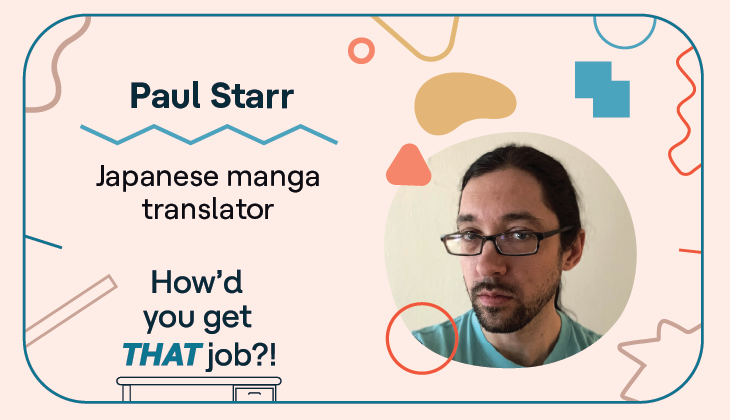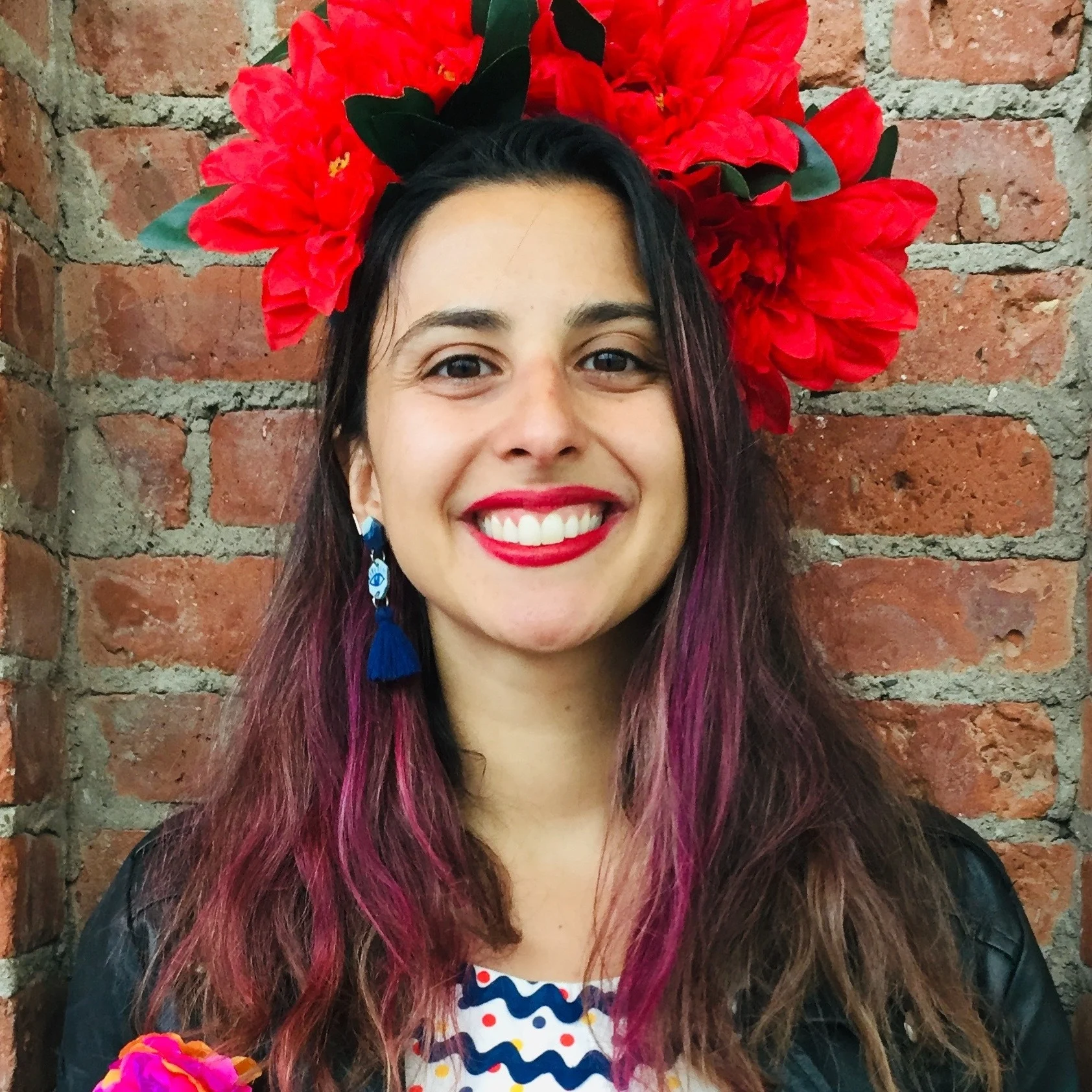Stay in the know
All our latest podcasts delivered right to your inbox.
From the first moment he saw the Japanese anime series Robotech (aka Macross), Paul Starr was hooked. But did it have something to do with ADHD? Paul was never motivated about anything before, but now he threw himself into learning Japanese so he could read comics.
One thing led to another, and eventually Paul started to work as a translator for Japanese manga and novels. But it took an embarrassing event at work — falling asleep at his desk — to make him realize that to follow his career dream, he needed to come to terms with ADHD.
Hear from Paul about the pros and cons of working as a Japanese translator and having an all-consuming passion. Get Paul’s recommendations of comics and manga that have story lines that showcase neurodiversity.
Manga, anime, and comics mentioned in this episode:
Witch Hat Atelier (Paul’s pick for neurodiversity)
Related resources
Episode transcript
Paul: Almost everybody in Japan reads manga, and they are about everything. What jumped out to me as I was getting into them was how different the stories were. Like instead of being about Spider-Man, it was about, like, a college kid who wants to get a girlfriend and ride his motorcycle. And as a college kid who wanted to get a girlfriend and had a motorcycle, this was highly relevant to my interests. So, like, it felt simultaneously, "Yes. This is what I've been looking for all along. And also this is unlike anything I've ever seen."
Eleni: From the Understood Podcast Network, this is "How'd You Get THAT Job?!," a podcast that explores the unique and often unexpected career paths of people with learning and thinking differences. My name is Eleni Matheou, and I'm a user researcher here at Understood. That means I spend a lot of time thinking about how we find jobs we love that reflect how we learn and who we are. I'll be your host.
So I'm always amazed at the wonderful diversity of jobs and careers that people with learning and thinking differences have. And our next guest is no exception. Paul Starr is a translator for Japanese anime and comic books. He was diagnosed with ADHD as an adult.
Paul can work from anywhere, but he is based in New Mexico at the moment. Welcome to the show, Paul.
Paul: Hey, it's great to be here. Thank you.
Eleni: So you discovered anime comic books and manga from a really young age before it was even, you know, trendy or mainstream, and you became obsessed with Japanese culture and ended up studying Japanese. Could you just go over the highlights of your love affair with Japanese culture?
Paul: Yeah, sure. My first introduction to anime and that whole genre was watching "Robotech" as a kid, which was, like, mid to late '80s. So "Robotech" was an American broadcast series, but it used essentially the footage of multiple other Japanese animated series, one of which was called "Macross." And that was the part that I was the most interested in. So I tracked down "Macross," watched the source so that I could figure out where this had come from. I watched that first "Macross" opening theme when I was in high school. And it was just, like, this moment of like, "Oh, my life is ruined. This is it."
Eleni: Before I ask a follow-up question about that, I'm actually not that familiar with anime. So I would love for you to describe what drew you to it.
Paul: I can't describe myself as a fan of "Robotech" back when, like, I was 10, 11, because I never watched it consistently enough to catch what was going on. But the handful of episodes I did see, there were two things that stuck out to me.
One was, it was the giant robot show where the robots were cooler than Transformers, which is impressive because I thought Transformers were very cool. And two, it was obvious that the episodes I caught were, like, part of a larger story; things weren't just wrapped up at the end of one episode. It was, like, a big story where the status quo would change over time. And that was catnip to me. And it was just like, "Oh, there's this, there's this larger world out there in this story. And I want to know more about it." As opposed to, like, the cartoons here, where everything will be wrapped up by the end of the episode. And that just really stuck with me.
Eleni: As someone that does not know a lot about this genre, could you explain the difference between American comics, Japanese anime, and manga in the simplest way possible?
Paul: Sure. At the time that I was getting into them, the kind of comics that you would get at the comic shop were American floppy single-issue comic books, where you'd buy, like, a floppy comic book that would have the latest chapter of "Spider-Man" in it or whatever.
And they were mostly about superheroes with the indie comics being about weird stuff. And we'll just leave that as it is. The manga market in Japan is huge. Almost everybody in Japan reads manga, and they are about everything. Anything you can imagine could be a manga and probably is. Not just superheroes. Anime and manga are mediums, not genres, and they contain genres within them. So there really is something for everybody. Like, no matter what kind of fiction you like, there is that of it in those mediums.
What jumped out to me as I was getting into them was how different the stories were. Like instead of being about Spider-Man, it was about, like, a college kid who wants to get a girlfriend and ride his motorcycle. And as a college kid who wanted to get a girlfriend and had a motorcycle, this was highly relevant to my interests. So, like, it felt simultaneously, "Yes. This is what I've been looking for all along. And also this is unlike anything I've ever seen." So, it was just, like, that potent combination.
Eleni: And I know that you said like, as a teenager, you're like, "Oh, my life is ruined. It's over for me." Wanna talk a little bit about, like, why you felt that way?
Paul: Oh, I mean, I'm joking. Like, I didn't think of my life was ruined. What I thought was, "Oh, this is the coolest thing I've ever seen. I've never cared about anything as much as I already care about this, like three minutes into it. I don't know what I was doing with my life before, but I know what I'm doing with it now."
Eleni: Yeah. That's pretty cool to find something that you're so into from such a young age. Did you expect to make a career out of this passion that you had?
Paul: No, not even a little bit. And my mom loves to tease me about this, because in one of my favorite comics, which was called "Oh My Goddess," in issue 2 of that comic, there was an essay in the back from the translator about the process of translation.
And I had never been interested in learning a foreign language before. I didn't know anything about the work of translation. And all I knew was that I loved this manga and anime stuff. And I wanted to be involved with it somehow. And I read this essay. And for some reason that was what stuck in my head as, "Oh, maybe I could do that." Maybe I could learn Japanese and I could be a translator. And probably I won't be able to be a translator for manga because there's only like a handful of manga being published. And obviously there will never be more than are being published now. But maybe, like, I could translate something else, and maybe eventually I'd get to do a little bit of manga someday.
Eleni: It's pretty amazing how impactful just that little nugget that you saw at the end of a comic could be, that, like, shaped your whole career path.
Paul: I think about it all the time. Like, that one essay somehow made me think, "Oh, maybe I could do that."
Eleni: Yeah. And it's so cool. Do you have a favorite anime or manga in general? Not necessarily one that you've worked on, but just one that you really enjoy?
Paul: Probably one of my very favorite anime of recent history is something called "Sound Euphonium." It's a TV series about a high school brass band, and it's just beautifully animated and beautifully written. And it's based on a series of novels that I was fortunate enough to get to translate one of, so I got to translate the English edition of "Sound Euphonium," and that was something I was really proud of. And the anime is just great. I totally recommend it. I'm almost positive it's streaming on Crunchyroll. Crunchyroll is a streaming service for anime.
One of the things that I would have been absolutely astonished by as a 17-year-old anime dork is back then, everything was so hard to get. It was all VHS, and the tapes were expensive and hard to find. And, you know, they were, like, releases of things that had come out years earlier in Japan. And now we get stuff streaming on the same day it broadcasts in Japan, fully professionally subtitled. And that just, I still can't quite wrap my head around that.
Eleni: I know that you said that you weren't diagnosed with ADHD until you were an adult. But now, reflecting back, and now that you have this diagnosis, do you think that it played a role in any way in terms of this, like, obsession with Japanese culture and with wanting to follow this interest?
Paul: I don't think there's a direct connection. I do think that there's the particular kind of, "I have to do this, and if I can't do this, then what's the point of anything?" A difficulty in pursuing things that I know I should work on but are not interesting to me. So, I wouldn't say that it played a role in, like, the specific nature of my interest, but I will say that I was motivated to study anything for the first time in my life at that point, because I wanted, I wanted to learn Japanese so that I could read these comics and I worked at it. Like, I applied myself for what felt like the first time ever, as opposed to just kind of coasting by or doing the bare minimum of what it would take to make the adults around me happy. I was — I would study actively outside of class, and this was unheard of for me. And it's taken a long time to learn to pay attention to that signal of, "Oh, I'm willing to do this, even when it's hard." I should probably understand what that means.
Eleni: Yeah, one thing that we've talked a lot about on this show and something I hear in my research a lot is this idea of hyperfocus and also, you know, only truly being motivated by things that are of interest. Do you think that applies to you at all?
Paul: Yeah, it absolutely does. I've learned some fairly painful lessons about the importance of paying attention to what a tendency towards hyperfocusing on something means and how to deal with things that must be done even when they are not the things that are engaging your hyperfocus at a given moment, and how to deal with the situation where you simply cannot do what you are trying to do.
It's not easy. Learning Japanese and studying it and getting better at it was fun and easy because I didn't care if it was hard, if that makes any sense.
Eleni: Yeah.
Paul: The actual work of translation is often not particularly engaging in certain ways. And it's been a challenge over the course of my career, learning how to deal with spending a lot of time on work where it's not easy for me to do it.
Eleni: Do you have, like, a favorite project that you've worked on or the thing that you're most proud of?
Paul: One of the things I'm proudest of is a series called "Cells at Work," which is about cells in the human body going about their business. And it's this very fanciful depiction of, what if the cells in your body were little people and they had jobs that they were doing?
Eleni: Cute.
Paul: And what would their day look like? And it's all based on, like, real medical science. So it was all super educational, but the art was just delightful and fantastic. And they did just such an exquisite job on that book that I felt like I just got to, like, put the final touches on it and, like, send it out into the world. And every time I see somebody at a convention wearing a "Cells at Work" costume or that book on the shelf, it just makes me feel so good about myself.
Eleni: I would love to check that out.
Paul: It's really good. I highly recommend it.
Eleni: OK. So I know that you were diagnosed with ADHD as an adult, and I'm wondering if there was a particular key moment that prompted you to go and get it checked out.
Paul: So, I was working as an editor at my first in-house job for many years, that had been very hard-won, and I was struggling. I had at least one, maybe two reviews by that point, and they weren't terrible, but they weren't great either. And I knew that I wasn't really keeping up. And in addition to all of that, I had started falling asleep at my desk. And it was really embarrassing. It turns out one of my responses to being understimulated or underengaged is to just fall asleep. One of the ways my particular neurology seems to work is that past a certain level of overwhelmedness or, like, disinterest in a task, I will simply fall asleep rather than do it. It was very difficult and hugely embarrassing. After being nudged awake a couple of times by a co-worker, I started looking into what this could be. And it very quickly led me to go see a doctor.
Eleni: Wow. Thank you for sharing that. Do you want to talk a little bit about how some of the things that you say that you're good at and some of those challenges, how they might relate to your ADHD?
Paul: Yeah, so, pretty empathetic as a person. Because I'd spent so long as a freelance translator myself, I could really put myself in the position of the translators I was working with. And, you know, although I'm sure I didn't do a perfect job, in general, I tried to communicate with them the way I wish I would have been communicated with myself.
I flatter myself to say I was decently good at the mechanics of editing itself, which was like finding mistakes in the translation, kind of crafting the prose to best exemplify, like, the message that book was trying to deliver. All that kind of stuff was fun and good. Sometimes the volume of the work would get to be overwhelming, and I'm sure anybody with a brain like mine knows how delicate it can be. When something seems, like, overwhelming in volume, what you should do is just get started on it. But that feeling of pre-overwhelmedness can just be paralyzing, and it makes you shut down. You're like, I, it's impossible to even start on.
Eleni: Yeah. It's interesting how you're using the word "pre-overwhelmedness." So it's like anticipation of feeling overwhelmed. It's like the fear of it coming even before it's even there.
Paul: Yeah, exactly. Frankly, to this day, I'm really bad at managing my email inbox. And so having an email job, where a lot of your job is, like, staying on top of emails and responding to emails in a timely fashion and organizing the information from the emails into, like, actionable items, that is nightmarish to me. That is the worst possible — it's so hard for me to do that. And I'll do almost anything to avoid it.
Eleni: Is there anything that you do that helps?
Paul: There were a few periods of time when I was doing better than others and being really ruthless about deleting emails quickly; about taking something that's in an email and putting it in some other place where I need it and then just getting rid of the email. But the process itself was so fiddly and difficult that the main lesson that I learned was it's probably not a good idea for me to have a job where a major part of it is, like, organizing stuff coming in through my email. Like, some, yes. A lot, no.
Eleni: Yeah. Would you want to talk a little bit about where you've landed now and how you've taken into account, like, some of those challenges to find something that works for you or that's a better fit?
Paul: Yeah. So I'm in kind of a strange place at the moment, although not a terrible one. So after about four years in editorial at two different publishers, uh, I was fired for essentially not being on top of my email enough. That's a glib way of putting it, but I was not performing to expectations.
And that was a really painful experience. No one faces that kind of experience without feeling kind of stung. But ultimately I understand that I had put the people around me in a difficult position, and that was a difficult realization to have to face. But one of the things that I took away from it was I knew something that none of my co-workers knew, which was the reason I had been falling behind was that I'd been spending half of my day or more programming.
I had gotten interested in writing little computer programs, like scripts to automate tasks for some of our letterers to make them faster and easier. This problem had been like catnip to my brain, like finding out a faster way to do something boring is great. So after being fired, I started working on expanding my programming skills. And I'm very close to finishing some software that I think is going to be really helpful for some people. And I'm considering trying to make that into another career.
Eleni: That's super cool.
Paul: The lesson that I would take from that is, like, if you find yourself spending hours a day doing something, that's a pretty strong signal.
Eleni: Yeah, it's really interesting because I definitely hear a lot that often people with ADHD do struggle with monotonous or repetitive tasks. And actually it sounds like what you were trying to do was find a more efficient and effective way for everyone across the team, which ultimately would have saved time in the long run. And you were trying to solve that problem, but it was, like, taking away from your everyday work.
Paul: Right.
Eleni: But you also mentioned a couple of times that one of the things you were struggling with or have struggled with is spending time alone and working alone. Do you want to talk a little bit about that and what you do to kind of combat that if you are working remotely?
Paul: It used to be more of a problem than it is now. Part of it is that I had inappropriate expectations set for what working on a team would actually be like by my very first professional translation job, which was working for the anime magazine "Newtype USA," back when it existed, in 2007 or so. I took that job, like, I was astonished to get it. And it was fantastic. It was absolutely amazing. The day was broken up into sort of small, manageable chunks, as was the work. I was never translating anything longer than a magazine article. And we would get together for like roundtable proofreading sessions, where everybody would like, sort of collaborate literally around a table on refining the translation and getting it up to snuff.
And I just thought, "Oh, this is what working in an office is." And it turns out, no, that's not what working in an office is like, that was, like, a beautiful hothouse flower of a job that could never live in the real world. So when I went from that to being a full-time freelance translator, it was very lonely because I was working from home and I didn't — I had almost nobody else to talk to. I had very few professional connections. And that is no longer the case. Like, now there are translator Discords, and having been in the industry for a long time, I know a bunch of other people that I can talk to. So I don't feel lonely when I'm working from home now the way I felt lonely when I was working from home before. And I wish, God, I wish that I had been connected to other translators when I was just starting out. Like, the first thing I do whenever I meet another new pro now is, like, "Oh, do you know about the translator Discord? You should totally join it because it's where everybody hangs out."
Eleni: It's interesting that you had talked about that feeling of being overwhelmed and then saying one of the reasons that you loved that particular job was that things were broken up into manageable chunks.
Paul: Right.
Eleni: And that is, like, a really common coping mechanism for people with ADHD.
Paul: Yeah.
Eleni: We often hear that that's one of the ways to feel less overwhelmed. Like, breaking things down into smaller tasks helps with that. And as you said, knowing where to start.
Paul: Yeah. Like, one of my biggest problems when translating prose books was looking down at the physical book in front of me and thinking, "This is a whole book. I can't translate a whole book. It's impossible to translate a whole book. No one's ever translated a whole book before; it can't be done." I say, having translated dozens and dozens of books before in my life, every time I look at a new one and look at page 1, it feels impossible. And, yeah, it took me a long time and, frankly, some therapy before I realized maybe I should find a way to only look at one page at a time.
It's really important to, like, never pay attention to how far, how far I am in it, or how much longer there is to go. Because the important thing is, like, translate the words that are in front of me right now. Look at this page. This is the page that you're on. Don't think about how many pages you've done or how many pages you have left to go. Just do this page.
Eleni: Yeah, that's a really good technique. So, I know we've talked a lot about translation and ADHD. So I wanted to ask, have you seen learning and thinking differences come up in any of your translation work?
Paul: One of the books I had the pleasure of working on is called "Witch Hat Atelier," as in studio. And it's about a girl who wants to become a witch and learn magic in this sort of fantasy land. And that sounds like a very generic setting, but it's anything but. The art is some of the most beautiful art I've ever seen in a comic book. And the story is about her and her handful of fellow apprentices as they come to grips with each of them having their own different approaches to doing magic. And it's such a sensitive portrayal of what it means to have to work inside your own limitations when your love for something is so much larger than that. And it's especially kind of astonishing to me because the author is one of the most talented artists and storytellers I've ever seen. And it's surprising to me that someone so skilled would have so much empathy for people who find things difficult. And it's just an exquisite work of art. So I do recommend "Witch Hat Atelier" to anybody.
Eleni: Wow. I love how much enthusiasm you have for these stories and how much appreciation you have for this work. It's definitely contagious. I'm like, I want to read that! I want to watch that! I feel like you should follow up with a list.
Thank you so much for being here, Paul, and for sharing your knowledge and enthusiasm about anime and manga with us, and your story.
Paul: Thank you for having me. It's been my pleasure.
Eleni: This has been "How'd You Get THAT Job?!," a part of the Understood Podcast Network. You can listen and subscribe to "How'd You Get THAT Job?!" on Apple, Spotify, or wherever you get your podcasts. And if you like what you heard today, tell someone about it.
"How'd You Get THAT Job?!" is for you. So we want to make sure you're getting what you need. Go to u.org/thatjob to share your thoughts and to find resources from every episode. That's the letter U, as in Understood, dot O R G, slash that job.
Do you have a learning difference and a job you're passionate about? Email us at thatjob@understood.org. If you'd like to tell us how you got THAT job, we'd love to hear from you. As a nonprofit and social impact organization, Understood relies on the help of listeners like you to create podcasts like this one, to reach and support more people in more places. We have an ambitious mission to shape the world for difference, and we welcome you to join us in achieving our goals. Learn more at understood.org/mission.
"How'd You Get THAT Job?!" was created by Andrew Lee and is produced by Gretchen Vierstra and Justin D. Wright, who also wrote our theme song. Laura Key is our editorial director at Understood. Scott Cocchiere is our creative director. Seth Melnick and Briana Berry are our production directors. Thanks again for listening.
Host
Eleni Matheou
leads user research for Understood. She helps Understood to center its work on the lived experiences and voices of people who learn and think differently.
Latest episodes
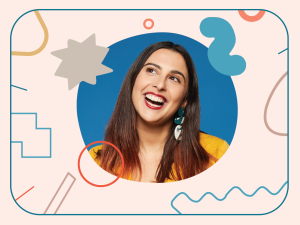
June 28, 2023
In the series finale of How’d You Get THAT Job?!, host Eleni Matheou unpacks what we’ve learned about how people thrive at work.

June 14, 2023
Nathan Friedman is the co-president and chief marketing officer of Understood.org. And he has dyslexia and ADHD. Learn how he got into the C-suite.
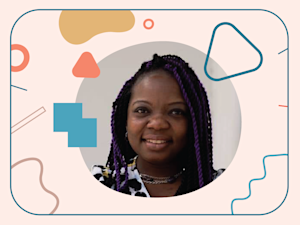
May 31, 2023
Dr. Loucresie Rupert is a child, adolescent, and adult psychiatrist with ADHD. She didn’t have an easy time getting her diagnosis as a Black woman.
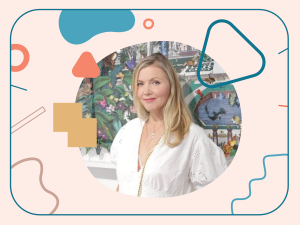
May 17, 2023
Kristjana Williams is a London-based Icelandic artist with dyslexia. She wasn’t diagnosed until she was 25, and now she has her own studio.

May 3, 2023
Aideé Chávez Frescas has ADHD, and is a senior social media manager at Understood. Her posts help end stigma and show others they’re not alone.
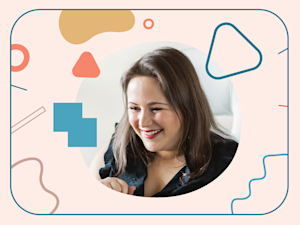
April 19, 2023
Alex Gilbert is a career coach with ADHD and dyslexia. After working in leadership development for years, she started her own coaching business.
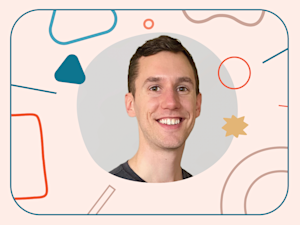
April 5, 2023
Dan Reis was diagnosed with ADHD during the pandemic. Now, he’s made it his mission to explore coping strategies to help him get his work done.
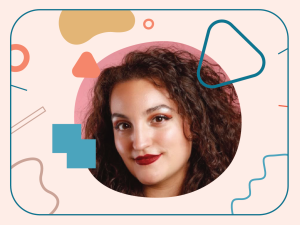
March 22, 2023
Rachel Basoco’s two jobs keep things interesting for her ADHD. She works full time at Fidelity, and part time at 11:11 Media, Paris Hilton’s company.
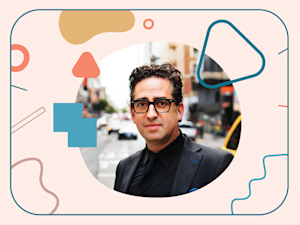
March 8, 2023
Gil Gershoni says that everything he does is dyslexic. He founded the branding firm Gershoni Creative and hosts the Dyslexic Design Thinking podcast.
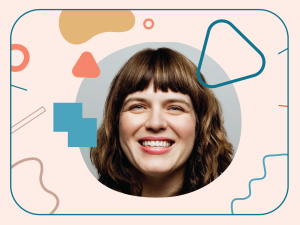
February 22, 2023
Claire Odom is a psychotherapist with ADHD. She’s also a disability inclusion consultant who has advice on navigating the workplace.
